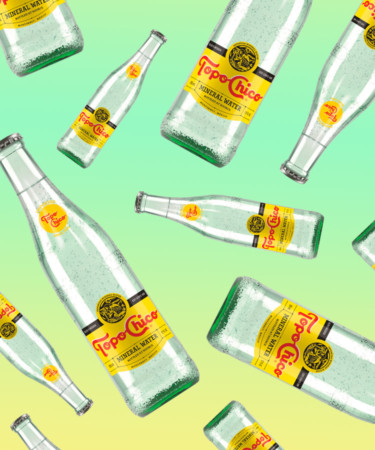From mythical spring water to arm tattoos, the history of Topo Chico runs the gamut. Founded in Mexico in 1895, Topo Chico’s exuberantly bubbly mineral water is now beloved around the world. It’s a favorite among bartenders and has exploded in popularity in recent years thanks to its starring role in Texas’s favorite tequila cocktail.
The Coca-Cola-owned company rolled the dice in the spring of this year to grab its share of the hard seltzer market. It launched Topo Chico Hard Seltzer with four flavors across nine states. Despite its early-on, limited availability, Beer Business Daily states that it already holds 3.2 percent of the national hard seltzer market.
Read on for nine things you should know about Topo Chico.
-
Its Origin Story Dates Back to 1440
The story begins nearly 600 years ago, when an Aztec princess came down with an unrecognizable disease. No one in the kingdom knew of a cure, so the king’s oldest priests spoke up about a nearby spring where the water was known to restore health and vitality. The princess trekked to the mole-shaped hill where the spring was found, and after tasting the water, she was cured. When Topo Chico was founded in 1895, it sourced and bottled the water from the same spring near the same mole-shaped hill.
-
Topo Chico Is Named After the Mole-Shaped Hill
Part of the allure of Topo Chico is how its name rolls off the tongue. When translated, its name nods to the mole-shaped hill where the spring water is sourced: “Topo” means “mole,” and “chico” means “small.”
-
Topo Chico Acquired Coca-Cola Long Before Coca-Cola Acquired Topo Chico
The relationship between Coca-Cola and Topo Chico is about 100 years old. In the 1920s, Topo Chico obtained the rights to bottle the soft drink in Mexico. It was the first company in Mexico to do so. It continued to bottle for another couple of decades until Coca-Cola moved its bottling to a brand new plant. The relationship between the two companies was reignited in 2001 when Topo Chico’s parent company, Procor, merged with two other bottling companies to become the second-largest Coca-Cola bottling group in Mexico. Then in 2017, Coca-Cola acquired the mineral water brand for $220 million.
-
Count It Toward Your Daily Electrolytes
As a mineral water, Topo Chico contains — you guessed it — minerals. The company is transparent about which minerals it includes and compares its levels against FDA standards. Its mineral list includes magnesium, calcium, and sodium, all of which are considered essential electrolytes vital for key functions in the body.
-
You Can’t Make Ranch Water Without Topo Chico
An authentic Ranch Water cocktail is made with Topo Chico, blanco tequila, and fresh lime juice. The abundant bubbles in Topo Chico play nicely against the earthy mineral notes in tequila. For an authentic experience, do as most bartenders do: Simply pour out a little of the water, and add the tequila and lime directly into the Topo Chico bottle. No glass, ice, or stir stick needed.
-
Some Call It Salty
Because of Topo Chico’s noticeable sodium level, drinkers claim it tastes a bit salty. This mild salinity helps create a refreshing profile and adds a nice note of complexity when mixing salt-rimmed concoctions — like Martha Stewart’s recipe for Marfa Ranch Water.
-
The Lone-Star State Is Topo Chico’s Unofficial Stateside Home
In recent years, Ranch Water’s popularity skyrocketed Topo Chico to the top of many bartenders’ cocktail must-have lists. However, people in Texas have been drinking the thirst-quenching creation for decades. And when Topo Chico Hard Seltzer was released in the U.S. in the spring of 2021, it quickly grabbed 20 percent of the Texas hard seltzer market.
-
There Are Some Die-Hard Topo Chico Fans Out There
Loyal Topo Chico drinkers claim it’s the best mineral water on the market due to its high — almost aggressive — levels of carbonation. One woman in Orange, Calif., took her love for the drink to new heights with a tattoo of Topo Chico Mineral Water on her arm.
-
It’s a Part of the Molson Coors Extended Family
In 2021, Topo Chico Hard Seltzer was born into the Molson Coors family of beverages as a sibling to brands like Coors Light, Pilsner Urquell, and Peroni, meaning the product can leverage nationwide distribution.
